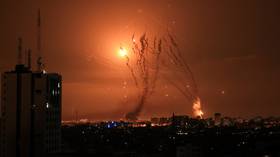Fyodor Lukyanov: Here’s why Israel’s continued existence is not guaranteed in the long term
The country isn’t used to operating without full American support and attention. It better start learning quickly
The fate of Palestine, home to the Holy Land of the world’s major religions, has been at the center of the most acute social and political processes not for centuries, but for millennia. But if we do not go back to antiquity, but only focus on modern times, we will find that the Palestinian question, in all its complexity, has been the quintessence of 20th century international politics. We are probably witnessing the end of this today, in the sense of policy and what it has yielded.
This paradigm contains the most important events of the last century, arguably starting with The First World War, which marked the beginning of the collapse of European empires and the fundamental redrawing of borders. As a result of WWI, the idea of self-determination triumphed throughout the Middle East, including in Palestine, which various peoples regarded as their ancestral homeland. The Second World War, with the nightmares of the Holocaust, led the world’s leading powers to consider the need to create a Jewish state, the configuration of which became the subject of intense conflict from the outset. This was part of the “Cold War”, with its distribution of spheres of influence and, consequently, the patronage of the superpowers over various regional powers. The bipolar world did not bring tranquility to the Middle East, with armed clashes following one another, but it did provide a framework to prevent the uncontrolled proliferation of international patronage.
With the end of the Cold War, everyone believed for a while that calm and justice would prevail, leading to the peace process crowned by the Nobel Peace Prize in 1994. The creation of two states in Palestine, declared by the UN in 1948, was heralded as an achievable goal, and its realization was vigorously pursued. However, it soon became clear that the elegantly crafted plan ran up against the historical and socio-political realities of the region, and the initial push for Palestinian national autonomy did not develop into a full-fledged state. What followed was a stagnation based on general hypocrisy – nobody cancelled the process, but there was no progress. The last major innovation was the “free democratic elections” imposed on Israel and the Palestinian Authority in 2006.
Back then, the Americans believed that all the problems of the Middle East would be solved with the arrival of democracy there. This is where the scourge of Hamas in its current form comes from – first the US forced the elections, which were won by the Islamic Resistance Movement, and then they themselves refused to recognize the results. Hamas’s subsequent violent seizure of power in Gaza created the very enclave from which Israel was attacked earlier this month.
The leitmotif of the varied history of a hundred years is that it has all taken place, if not under the dictates of, then with the active participation of external forces. The composition of the latter has changed, but in every combination such players have set the tone. The change that has taken place now is that outside players are forced to react to events initiated by regional forces. This reaction is based on accumulated experience, but it does not work the way it used to. The degree of self-determination of the states in the region (let us call it the pursuit of national interests as they understand them) is much higher than in the past. Meanwhile, the major countries are running out of the instruments of coercion that worked in the twentieth century.
US President Joe Biden’s arrival in Israel in the midst of the violence could be described as an act of political courage, were it not for the suspicion that Washington simply does not fully appreciate the urgency of the situation. In the aftermath of the horrific hospital tragedy in Gaza, it is understandable that a sharp escalation is taking place. But before that, the United States probably thought it could drag its feet.
The idea seems to be to support Israel by pre-empting its most dangerous actions and reassuring the Arab countries – especially in the Persian Gulf – that the old agenda will be restored once passions subside. It is also to prevent Iranian interference by making it clear that it will trigger American military involvement, but if Tehran shows restraint, a return to talks on unfreezing money and relations cannot be ruled out. Finally, Biden wishes to guarantee a package decision on financial assistance to all of his major military clients – Israel, Ukraine and Taiwan – that will not allow one of them to be blocked individually.
Right now, the whole delicate plan is hanging by a thread. And the problem is not specific political and diplomatic mistakes, but a fundamental inability to manage processes in the way the US and big countries in general are used to, believing they have the levers for everything. This is a systemic change, the consequences of which could be anything.
The transition from external regulation of the region to internal balance is painful, and success is not predetermined. Thus, Israel’s problem is that the overwhelming power advantage it has relied on for three-quarters of a century is no longer a reliable guarantee of its existence. The overall balance in the region will not shift in the Jewish state’s favor, and its patron’s attention may be diverted by other internal and external crises. Meanwhile, West Jerusalem has no experience of making long-term arrangements with its neighbors without relying on the US.
So, the question now is whether there is time for the Israelis to learn to live in a new way.
This article was first published by Rossiyskaya Gazeta newspaper, translated and edited by the RT team
You can share this story on social media:









Comments are closed.